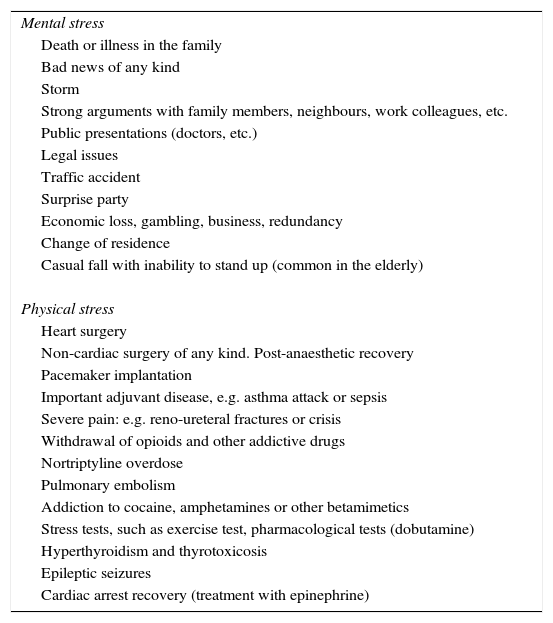Takotsubo syndrome, apical ballooning or “broken heart” syndrome, is a growing diagnostic entity which clinically mimics an acute coronary syndrome. Included into the stress cardiomyopathy group of cardiopathies, this condition is characterized by the absence of potentially responsible coronary lesions, while displaying a transient abnormal ventricular motion, usually affecting various coronary territories. It is generally observed in postmenopausal women and frequently seen in the presence of a stressful situation, both physical and emotional. With a prevalence of 1.2% among patients undergoing a cardiac catheterization with a suspected diagnosis of acute coronary syndromes, Takotsubo syndrome usually has a good prognosis. However, complications can occur in the acute phase, generally heart failure, which can even lead to death. In this review we discuss the latest available information on this disease and present it in a practical and useful way for the attending physician.
El síndrome de Takotsubo, apical balloning o síndrome del «corazón roto», es una entidad de diagnóstico creciente que mimetiza clínicamente un síndrome coronario agudo. Englobado en el grupo de las miocardiopatías de estrés, se caracteriza por la ausencia de lesiones coronarias potencialmente responsables del cuadro y una paradójica alteración en la motilidad ventricular de carácter transitorio, que suele interesar varios territorios coronarios. Se observa generalmente en mujeres posmenopáusicas y se describe con frecuencia la presencia de una situación estresante, tanto física como emocional. Con una incidencia aproximada del 1,2% de aquellos síndromes coronarios agudos sometidos a cateterismo, a pesar de conllevar generalmente un buen pronóstico, ocasionalmente presenta en la fase aguda complicaciones, generalmente insuficiencia cardiaca, que pueden conducir incluso al fallecimiento de los enfermos. En la presente revisión nos planteamos repasar la última información disponible y presentarla de un modo práctico y útil al clínico.










